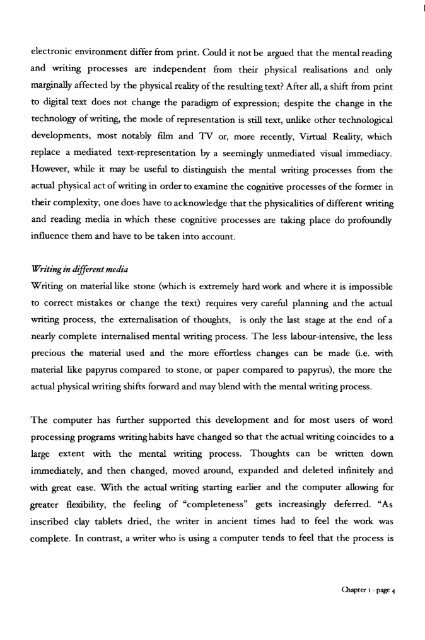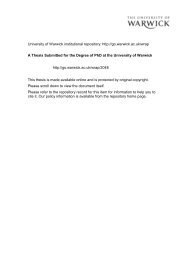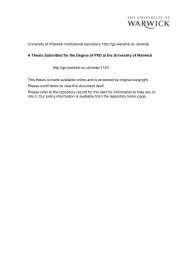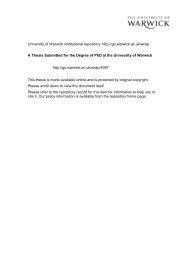From Page to Screen - WRAP: Warwick Research Archive Portal ...
From Page to Screen - WRAP: Warwick Research Archive Portal ...
From Page to Screen - WRAP: Warwick Research Archive Portal ...
Create successful ePaper yourself
Turn your PDF publications into a flip-book with our unique Google optimized e-Paper software.
electronic environment differ from print. Could it not be argued that the mental reading<br />
and writing processes are independent from their physical realisations and only<br />
marginally affected by the physical reality ofthe resulting text? After all, a shift from print<br />
<strong>to</strong> digital text does not change the paradigm of expression; despite the change in the<br />
technology ofwriting, the mode of representation is still text, unlike other technological<br />
developments, most notably film and TV or, more recently, Virtual Reality, which<br />
replace a mediated text-representation by a seemingly unmediated visual immediacy.<br />
However, while it may be useful <strong>to</strong> distinguish the mental writing processes from the<br />
actual physical ac<strong>to</strong>fwriting in order <strong>to</strong> examine the cognitive processes ofthe former in<br />
their complexity, one does have <strong>to</strong> acknowledge that the physicalities ofdifferent writing<br />
and reading media in which these cognitive processes are taking place do profoundly<br />
influence them and have <strong>to</strong> be taken in<strong>to</strong> account.<br />
Writingin different media<br />
Writing on material1ike s<strong>to</strong>ne (which is extremely hard work and where it is impossible<br />
<strong>to</strong> correct mistakes or change the text) requires very careful planning and the actual<br />
writing process, the externalisation of thoughts, is only the last stage at the end of a<br />
nearly complete internalised mental writing process. The less labour-intensive, the less<br />
precious the material used and the more effortless changes can be made (i.e. with<br />
material like papyrus compared <strong>to</strong> s<strong>to</strong>ne, or paper compared <strong>to</strong> papyrus), the more the<br />
actual physical writing shifts forward and may blend with the mental writing process.<br />
The computer has further supported this development and for most users of word<br />
processing programs writinghabits have changed so that the actual writing coincides <strong>to</strong> a<br />
large extent with the mental writing process. Thoughts can be written down<br />
immediately, and then changed, moved around, expanded and deleted infinitely and<br />
with great ease. With the actual writing starting earlier and the computer allowing for<br />
greater flexibility, the feeling of "completeness" gets increasingly deferred. "As<br />
inscribed clay tablets dried, the writer in ancient times had <strong>to</strong> feel the work was<br />
complete. In contrast, a writer who is using a computer tends <strong>to</strong> feel that the process is<br />
Chapter I - page 4





